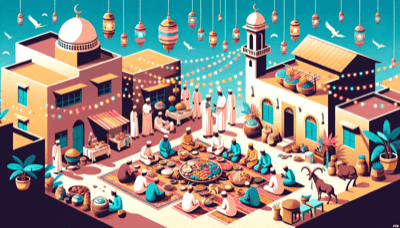We're here to help you keep count of the days to or since a date. Just click the button below and enter your chosen date to get started. Also choose the suggested days or search for a special day above #countingthedays

Eid al-Adha, also known as the Feast of Sacrifice, is one of the two most important Islamic holidays celebrated in Guinea, a predominantly Muslim country. This festival commemorates the willingness of Ibrahim (Abraham) to sacrifice his son as an act of obedience to God's command before God provided him with a ram to sacrifice instead.
History and Significance: The history of Eid al-Adha is tied to the Islamic story of the prophet Ibrahim, which parallels accounts in Judaism and Christianity. The day marks the culmination of the Hajj pilgrimage to Mecca, which is one of the five pillars of Islam. Although not all Muslims in Guinea can make this pilgrimage, they join in celebrations with those who have completed this religious journey.
Traditions and Practices: On Eid al-Adha, Guinean Muslims begin their day with a special prayer called Salat al-Eid. This prayer is usually offered in a large congregation in open fields or local mosques across towns and cities. Before the prayer, it is customary for Muslims to perform an act known as Qurbani – the sacrifice of an animal like a sheep, goat, cow or camel – echoing Ibrahim's sacrifice.
The meat from the sacrificed animal is divided into three parts: one share for the family, one share for relatives and friends, and one share for the poor and needy. It symbolizes acts of charity towards others and reinforces social bonds within communities.
Families dress in their finest clothing, visit relatives and friends, exchange gifts, and children often receive small sums of money or presents. Special festive meals are prepared where members come together to feast on various dishes made from the sacrificial meat.
What People Do on This Day:
Celebrations can last up to three days throughout Guinea and are marked by a spirit of generosity, piety and communal harmony.